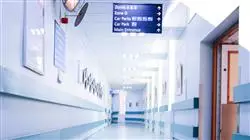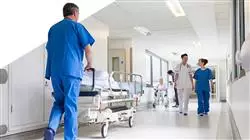University certificate
The world's largest faculty of nursing”
Description
With this 100% online professional master’s degree you will be up to date in 12 months with the advances and changes in the improvement of Patient Quality and Safety in the healthcare field"

One of the constant challenges of healthcare systems is to maintain quality criteria in patient care and attention, and also to maintain the important patient safety in all diagnostic and therapeutic procedures in which the patient participates. Thus, establishing measures and protocols for action in this regard are key to the satisfaction and improvement of the well-being of the person.
In this scenario, the role of the nursing professionals is of vital relevance given his proximity and direct contact with the person at all times, from their admission to the clinical or hospital center until their medical discharge. For this reason, TECH has designed this professional master’s degree in Patient Quality and Safety for Nursing, aimed at providing the most up-to-date information on methodologies that enhance the humanization of healthcare, healthcare ethics and the incorporation of new technologies.
A program with a theoretical-practical approach that will allow you to delve into the use of the most notorious advances in Big Data and Machine Learning, adverse events in clinical care, pediatric patient safety, drug safety and advances in patient safety in surgical block.
A comprehensive syllabus, complemented by video summaries of each topic, videos in detail, readings and case studies that give greater dynamism and attractiveness to this update. In addition, thanks to the Relearning system, based on the continuous reiteration of the most important contents of the program, students will be able to reduce the hours of memorization.
A unique program in the academic panorama, which offers the graduates the opportunity to self-manage the study time and access the information of the syllabus, comfortably whenever and wherever they wishes. It only requires an electronic device (cell phone, tablet or computer) with internet connection to visualize, at any time of the day, the content of this program. An ideal opportunity to study a program that meets the real needs of professionals.
Are you looking for a quality university degree that is compatible with your daily activities? This is the most suitable academic option for you. Upgrade with TECH"
This professional master’s degree in Patient Quality and Safety for Nursing contains the most complete and up-to-date scientific program on the market. The most important features include:
- The development of case studies presented by healthcare experts in Patient Quality and Safety
- Graphic, schematic, and practical contents with which they are created, provide scientific and practical information on the disciplines that are essential for professional practice
- Practical exercises where the self-assessment process can be carried out to improve learning
- Its special emphasis on innovative methodologies
- Theoretical lessons, questions to the expert, debate forums on controversial topics, and individual reflection work
- Content that is accessible from any fixed or portable device with an Internet connection
With the Relearning method you will forget about long hours of study and memorization, focusing mainly on the key concepts of this program"
The program includes in its teaching staff professionals from the sector who bring to this program the experience of their work, as well as recognized specialists from leading societies and prestigious universities.
Its multimedia content, developed with the latest educational technology, will provide the professionals with situated and contextual learning, i.e., a simulated environment that will provide an immersive education programmed to learn in real situations.
The design of this program focuses on Problem-Based Learning, by means of which the professionals must try to solve the different professional practice situations that are presented throughout the academic course. This will be done with the help of an innovative system of interactive videos made by renowned experts.
You will be aware of the use of new technologies such as Big Data or Machine Learning used in the healthcare field”

Deepen your knowledge of the advances in biobank safety and transfusion safety and implement them in your daily practice”
Objectives
The purpose of this professional master’s degree is to facilitate the update on the measures to be implemented in the field of Quality and Patient Safety for Nursing and the promotion of health competencies in the various risk situations that must be solved. All this, in just 12 months and with a comprehensive agenda based on the latest scientific evidence in this field. A unique opportunity to update that only TECH, the largest digital university in the world, can offer you.

In just 12 months you will be able to complete a complete update on Quality and Patient Safety for Nursing"
General Objectives
- Analyze the importance of humanization in health care, the need for respect for life, human dignity and a holistic understanding of the person made vulnerable by illness
- Identify situations and risk factors in the pediatric patient
- Determine the main preventive measures implemented in pediatric patient safety
- Justify the importance and guidelines of surgical safety in the public health setting by defining a minimum set of measures
- Promote safe working environments for patients and professionals
- Promote research, innovation and training in patient safety
- Analyze the management of adverse events and their improvement plans to avoid them
- Deepen in the concepts, methods and strategies for the improvement of patient safety in healthcare institutions
- Substantiate the best evidence on safety from biobanks and transfusion safety technologies
- Analyze patient safety strategies approached from different healthcare areas
Specific Objectives
Module 1. Healthcare Quality Management Systems in Healthcare Institutions
- Analyze the different models and systems of quality management
- Update specialized knowledge on management by care processes
- Propose techniques and tools for quality improvement
- Develop the tools to carry out a continuous quality improvement cycle
- Determine the different models of quality certification in healthcare institutions
- Establish keys to excellence in healthcare institutions
- Identify the essential aspects for the development of effective leadership in healthcare professional teams
Module 2. Clinical Risk Management
- Provide a comprehensive view of all elements that can affect patient safety
- Delve into the different phases that make up clinical risk management
- Establish actions aimed at preventing adverse events from occurring by having the necessary knowledge to minimize them
- Identify prevention and control measures to reduce healthcare-associated infections
- Propose actions aimed at user participation in patient safety
- Develop corrective measures aimed at minimizing clinical risk
- Analyze the concept of satisfaction and perceived quality. Identify the instruments to know the users' opinion
Module 3. Quality of Care and Ethics in Healthcare Institutions
- Develop the four principles of bioethics
- Update knowledge on the application of the deliberative method to clinical decisions
- Examine the application of bioethics in end-of-life health care decisions
- Apply Ethics in Medical Research
- Deepen the key points of respect for the patient
- Analyze ethical actions in conflicting situations
- Value the figure of palliative care
- Establish the importance of ethical values in organ donation
Module 4. Health Technology Assessment
- Evaluate health technologies at the international level. Current Situation and Future Prospects
- Evaluate healthcare technologies, their impact and associated costs
- Deepen the role of the Electronic Health Record in Patient Safety and Quality of Care
- Incorporate the Big Data and Artificial Intelligence
- Delve into the exploitation of the electronic health record for patient safety and Natural Language Processing to extract knowledge in patient safety
Module 5. Safety of Medicines and Medical Devices. Pharmacy and Hematology
- Determining adverse effects in high-risk drugs and strategies for error prevention
- Update knowledge on monitoring by pharmacokinetics
- Analyze the Pharmacovigilance System
- Conduct a review of errors with medical devices: adverse incidents, alerts and notifications
- Examine robotic systems for drug packaging and dispensing and unit dose dosing systems, repackaging and unit dose manufacturing, automated and conventional systems
- Indicate the safety of biobanks and transfusion safety
- Develop safety aspects related to medication
Module 6. Errors in Health Care and Adverse Events
- Provide a basis for the different models and systems of adverse event management
- Update knowledge about patient safety
- Propose techniques and tools for the improvement of patient safety
- Develop the tools to carry out a safety plan
- Analyze the different models of clinical practice guidelines and the evaluation of adherence to them
- Delve into the keys to patient safety in the healthcare environment
Module 7. Organizational Safety
- Identify security risks in health information management
- Analyze the different organizational structures to promote patient safety
- Implement new, more attractive and modern security training methodologies
- Assess the impact of safety in terms of efficiency
- Detect the key aspects to be monitored for a safe control of the facilities
- Promote knowledge of environmental safety in the healthcare environment
- Position the patient as a key element in patient safety
Module 8. Patient Safety in the Surgical Block. High Risk Areas
- Update the functional and structural characteristics of the Surgical Block directly related to patient safety
- Analyze the interventions that professionals must carry out to ensure the safety of patients receiving surgical treatment, essential to contribute to the reduction of adverse effects related to the same
- Analyze the situations in the surgical practice environment susceptible to risk for the patient and the most common risks
- Examine the different activities, methods and tools for the improvement of surgical safety
- Develop the different programs and strategies as a tool for the improvement of surgical safety, as well as their level of implementation in the surgical area
- Identify the role of healthcare professionals in strategies to improve patient surgical safety
- Establish different safety controls that can be performed in any operating room
Module 9. Pediatric Patient Safety
- Acquire the ability to identify the pediatric patient as vulnerable
- Elaborate risk maps to detect the most frequent adverse events in the pediatric age group
- Objectify the risk situations of the neonatal patient and his environment
- Consider the safety of the pediatric patient in clinical research
- Analyze diagnostic processes and functional tests as generators of safety incidents in children
- Identify safety risk situations in the pediatric critical patient and their environment
- Review the pediatric surgical and anesthetic process as a safe environment
- Know how to detect safety risks in the pediatric patient of special vulnerability: palliative, oncologic and pain management
Module 10. Humanization of Healthcare
- Promote Humanization in Healthcare
- Analyze the fundamental axes for humanized care: the patient and their family health care personnel and organizational structure
- Investigate the humanization of health care for particularly vulnerable patients
- Update knowledge in order to draw up a humanization plan
- Examine the value-based management model

It delves into the main situations of surgical healthcare practice that may pose a risk to the patient with the best didactic material"
Professional Master's Degree in Quality and Patient Safety for Nursing.
Patient quality and safety are fundamental aspects of nursing care and are closely related to patient satisfaction, error prevention, and improved clinical outcomes. Nurses have a great responsibility in ensuring such quality and safety. At TECH Global University we have this master's degree, designed to provide nurses with the skills and knowledge necessary to ensure the safety and quality of health care.
To ensure quality and patient safety, nurses must meet certain standards and practices that are designed to reduce risks and prevent errors. Quality and patient safety are essential to nursing care and should be a priority for the entire healthcare community. Nurses are responsible for ensuring that nursing practices are performed in a safe and effective manner, avoiding any risk to patient health at all times. In addition, it is important that healthcare professionals work together to constantly improve the quality and safety of healthcare. Our master's degree will address topics such as risk management, patient safety assessment, quality and safety improvement, and data analysis for decision making.







